Want to see Firefall in Yosemite National Park this year? Here’s everything you need to know about visiting and photographing this unique natural phenomenon.
Shooting Firefall is a photographer’s dream. Although we’ve visited Yosemite a handful of times, I never had the chance to shoot Firefall until this year.
During the day, we had fun doing winter activities in Yosemite National Park before heading to the Firefall viewing area a couple of hours before sunset. Even if you’re not interested in seeing Firefall, February is a great time to visit since the rest of the park is relatively empty.
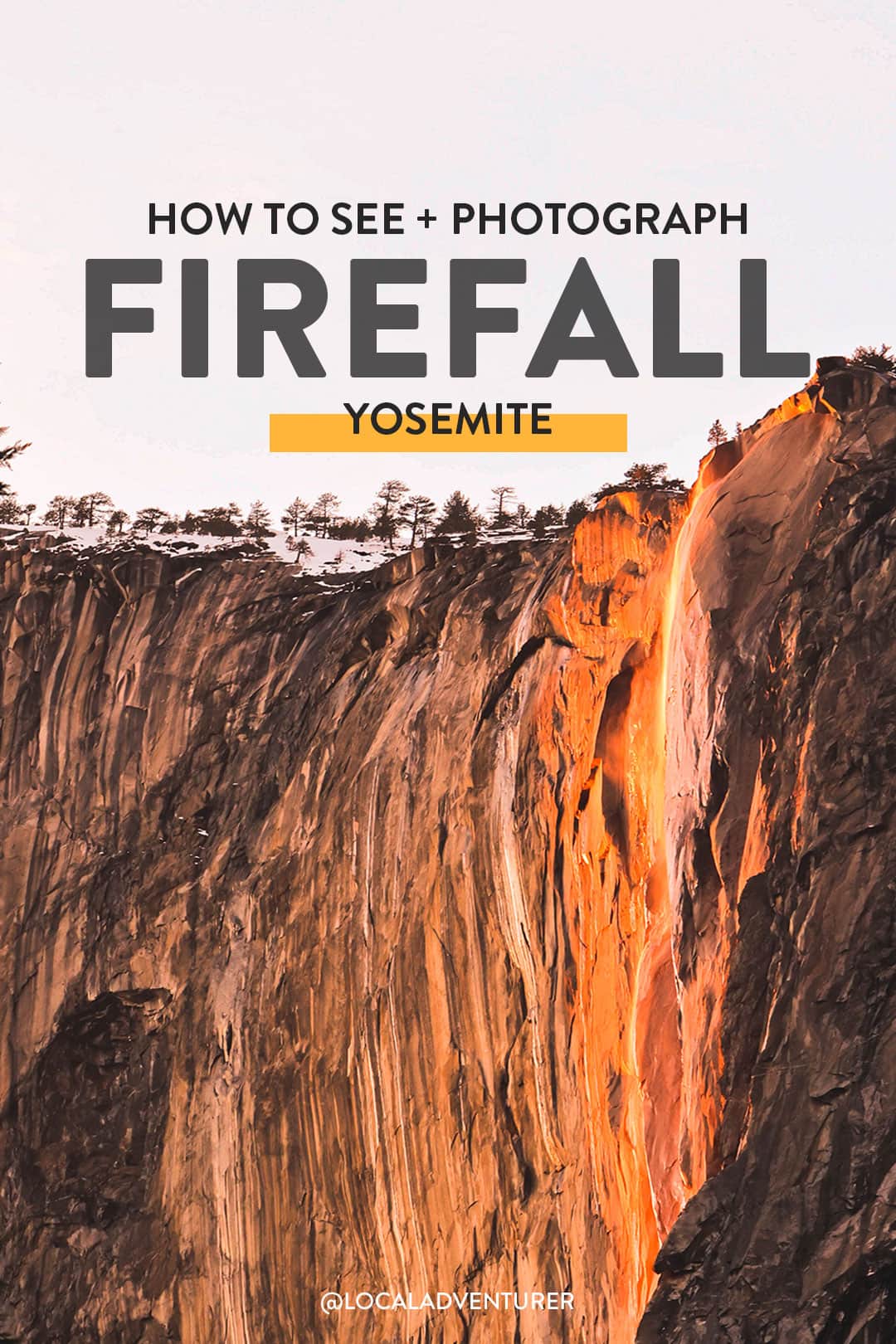
Special thanks to Travel Yosemite for sponsoring this post. All opinions are always our own. This post may contain affiliate links, where we receive a small commission on sales of the products that are linked at no additional cost to you. Read our full disclosure for more info. Thank you for supporting the brands that make Local Adventurer possible.
Last Updated: January 14, 2025
About Firefall + What is Firefall?
Firefall is a natural phenomenon when the sun hits Horsetail Fall in Yosemite at the perfect angle so that it lights up to looks like lava flow. Depending on the day, you may get yellow, orange, or pink hues.
It used to only be popular among photographers but has since become one of the most popular events in Yosemite National Park for everyone.
In 1872, the original Yosemite Firefall was a tradition that began and continued for almost a century. During the summer, they created a massive fire on top of Glacier Point. When the fire died, they pushed the heaping pile of burning hot embers over the edge, which looked like a glowing waterfall from a distance. This practice ended in 1968 because the park shifted its focus to natural wonders, not manufactured ones.
Fortunately, a natural Firefall still happens at Horsetail Fall every February when the conditions are just right.
See More: 17 Breathtaking Things to Do in Yosemite National Park
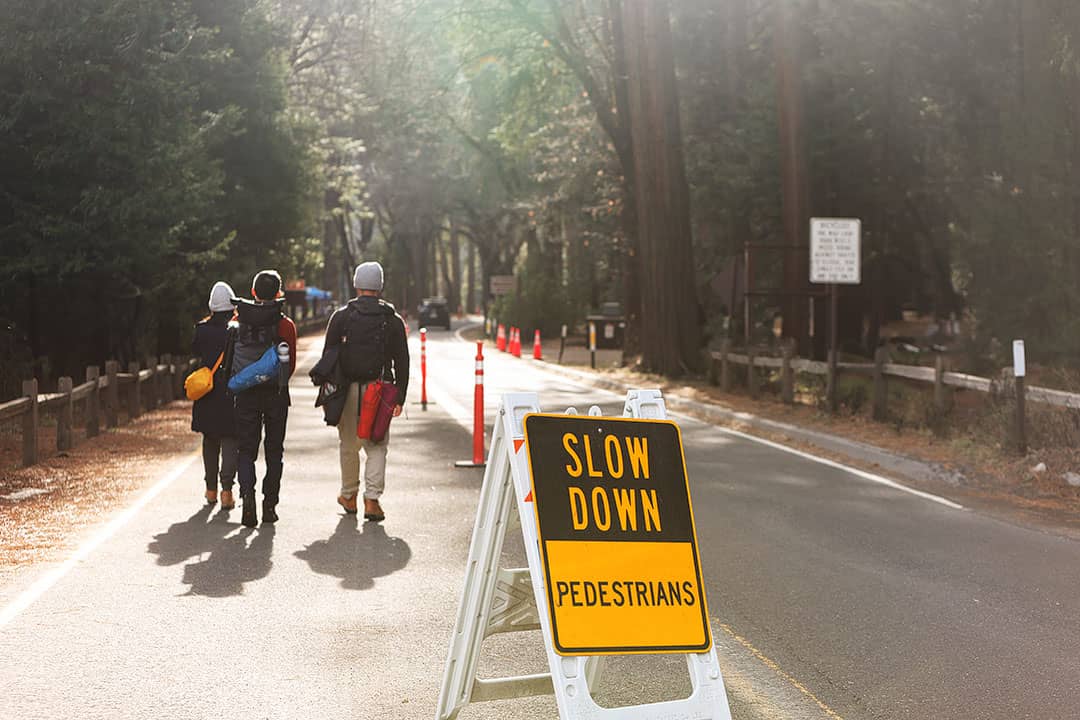
When is Firefall Yosemite 2025
It’s possible to see Firefall in October or February, but February usually has the most favorable conditions.
In 2025, Firefall will happen February 8-23. The sun hits at the best angle around President’s Day weekend, and you get a fuller waterfall with more snowmelt, but the differences are minor, and you also have more crowds.
When we went mid-February (12-14), we got one clear day, which looked intense, and one partly cloudy day, where clouds diffused the sun and gave the falls a lighter pink glow. On the last day, it started raining, so Firefall did not happen.
What Time is Firefall in Yosemite
In mid-February, it started at 5:25 pm. Approximately 10-15 mins before sunset, the glow is brightest and most concentrated.
See More: A Yosemite Winter Wonderland
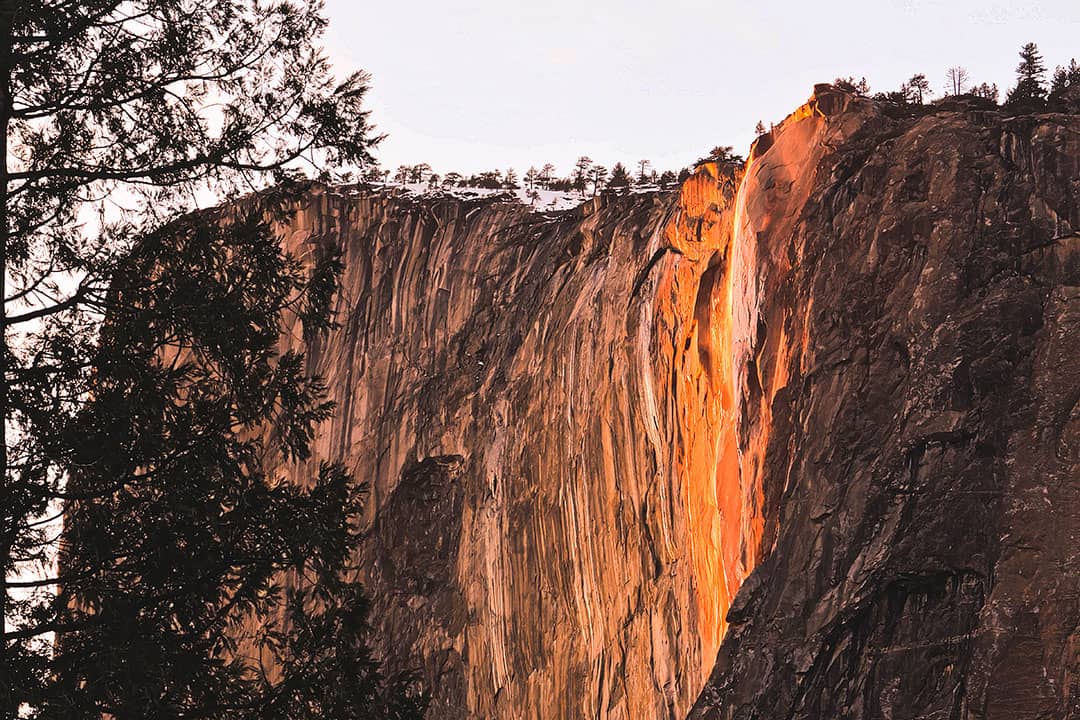
Conditions for Firefall
Firefall is magical because nature can be unpredictable, and the conditions must line up. So not only do you have to be in Yosemite at the right time, but you have to have luck on your side. We only got one good day out of the three we spent in the valley.
1. The Perfect Alignment of the Sun
The first thing you need is the correct alignment of the sun, which happens every mid to late February (and also in October). The sun is at just the right angle to hit Horsetail Falls and light it up.
2. Horsetail Fall has Enough Water
For the waterfall to light up, there needs to be enough water from the snowmelt. You won’t see it during exceptionally cold or dry years.
Local Tip: There isn’t a webcam for Horsetail Fall, but you can check out the Yosemite Falls webcam, another seasonal waterfall, to see how much water is flowing. Keep in mind Yosemite Falls is typically fuller than Horsetail.
3. Clear Skies
The third thing you need is clear skies. One cloud could block the whole thing from happening. However, we recommend you wait it out in case the clouds could give you the tiniest opening for the sun to peek through for an extra magical Firefall.
On our second day there, the skies were cloudy. It still never opened up entirely, but they were thin enough to where some light could get through (see photo 2).
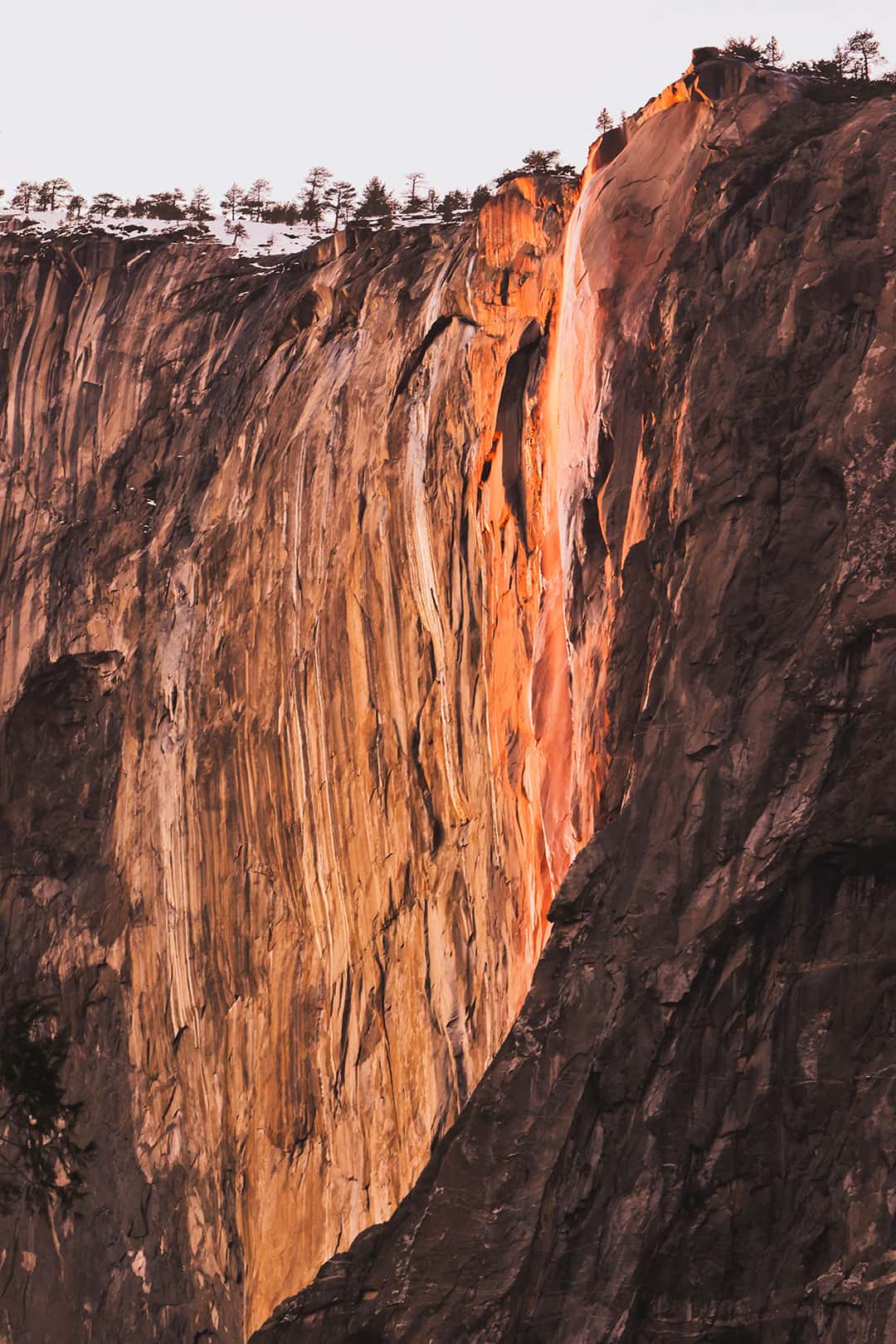
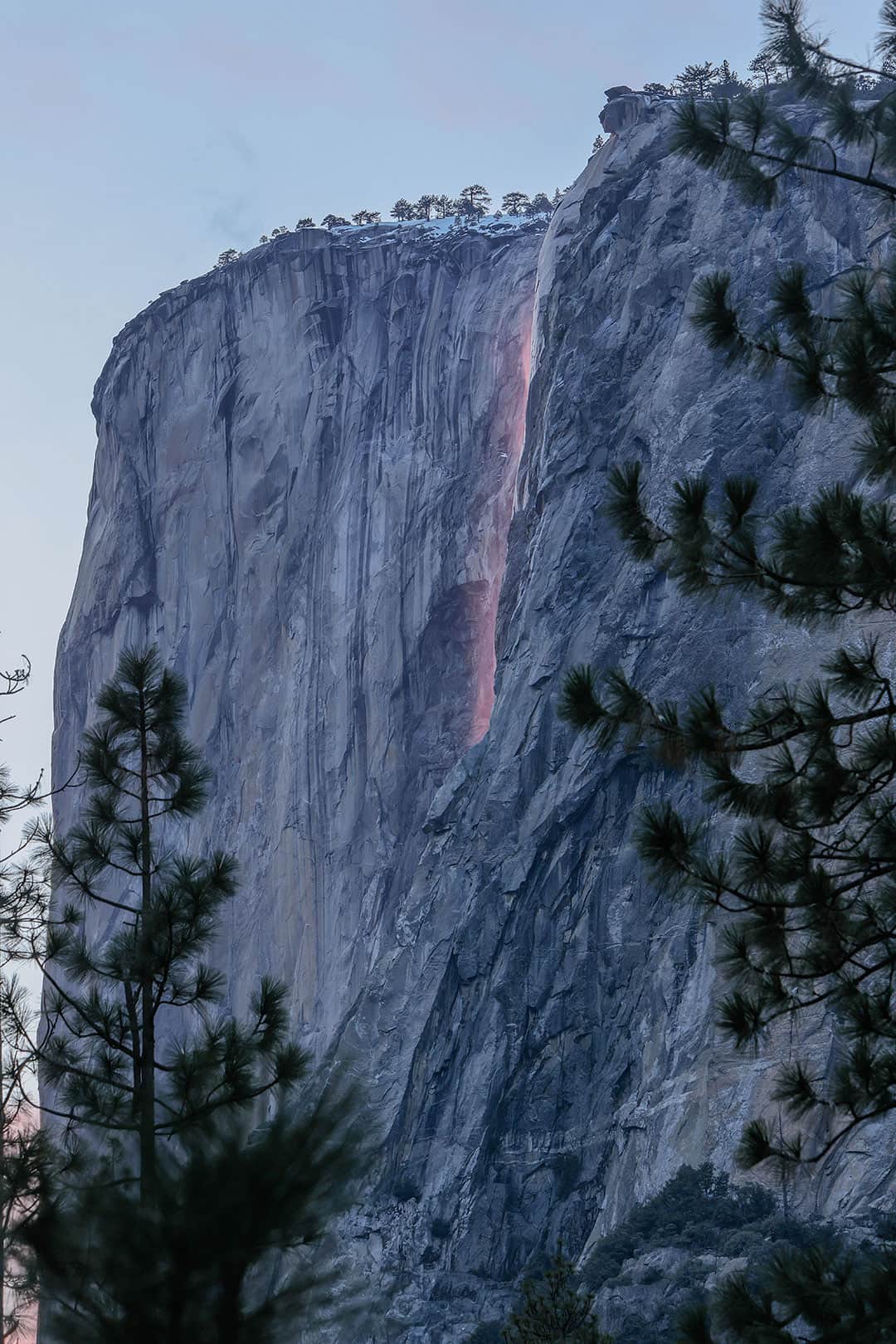
Reservations During Firefall
Because Firefall is so popular, Yosemite National Park implemented some restrictions in February to help with crowds and protect the valley.
Reservations are required to drive in Yosemite 24 hours a day on weekends (make reservations here). The first 50% of reservations go live on December 1st at 8 AM PST, and the remaining 50% are available two days before at 8 AM.
2025 required reservation dates:
- February 8-9, 2025
- Feb 15-17, 2025
- February 22-23, 2025
During the week (except for President’s Day), you do not need a reservation to enter the park and can pay the regular entrance fee.
In addition, there are specific areas to park and view Firefall. Everything else is coned off and patrolled.
Pro Tip: Pick up an America the Beautiful pass to save money if you visit multiple national parks within a year. This annual pass gives you access to sites managed by the Forest Service, National Park Service, Fish and Wildlife Service, Bureau of Land Management, Bureau of Reclamation, and Army Corps of Engineers. It doesn’t waive reservation fees; it only covers entrance fees.
See More: 11 Famous Hiking Trails with the Hardest Permits to Get in the US
Where to Park for Firefall yosemite
The closest parking to Horsetail Falls is the Yosemite Falls Parking Area, located right next to Yosemite Valley Lodge. There are signs to help direct you here. Handicap parking is closer to the viewing site.
The roads on this portion of the loop are limited to one lane during Firefall season, so you can’t park, stop, or unload passengers between Camp 4 and El Capitan.
After parking, it’s roughly a 1.5 mile or 30-45 minute walk to the viewing area. One lane of the road is coned off for pedestrians, making it an easy walk.
If the parking lot is full, head to Yosemite Village for overflow parking. A free shuttle also takes people from Yosemite Village to the Yosemite Falls Parking Area.
Unfortunately, the other side of the Merced River is closed off. Stopping is prohibited between the El Capitan crossover and Swinging Bridge Picnic Area and between the road and the river. In 2017, the riverbank collapsed because there were so many people.
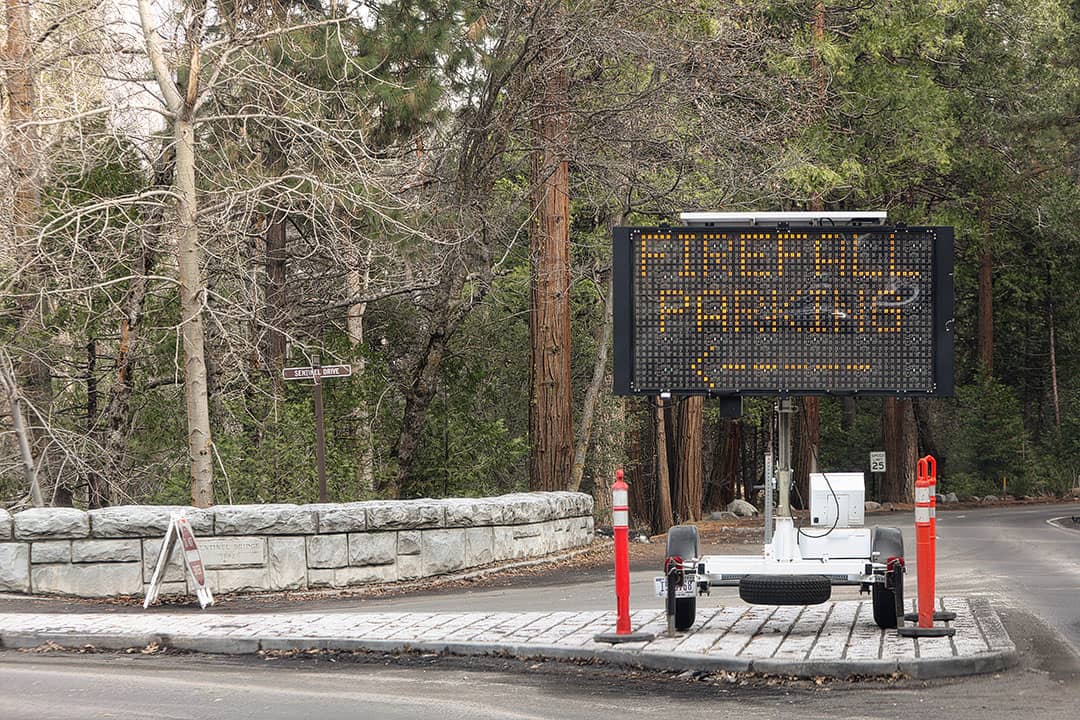
Firefall Viewing Areas
The only designated location to view Firefall is just east of the El Capitan Picnic Area. It’s marked and easy to find. Plus, most likely, you’ll see other people.
That’s the furthest south/west you’ll want to go before seeing too much of the face. You see more of the waterfall from the main area or a more dramatic angle and fewer crowds slightly north/east of it, but this is all up to your personal preference.
We went here on the first day, then stopped at an alternate spot for our second day to get a different vantage point. In past years, people found any spot they could in the valley, which led to collapsed river banks and trampled meadows.
I was afraid of the crowds, but going mid-February on a weekday, I was pleasantly surprised to find it less crowded than the videos I’ve seen.
We were the first set of photographers to arrive at 3 PM on the first day. By 5 PM, there were 200+ people. The ranger told us weekends are at least 6x more crowded, with President’s Day weekend being the busiest. The second day, we arrived around 4:15 PM and still found a spot we liked.
There’s still plenty of space to shoot since we’re all shooting up with a long lens. People shoot from both sides of the road.
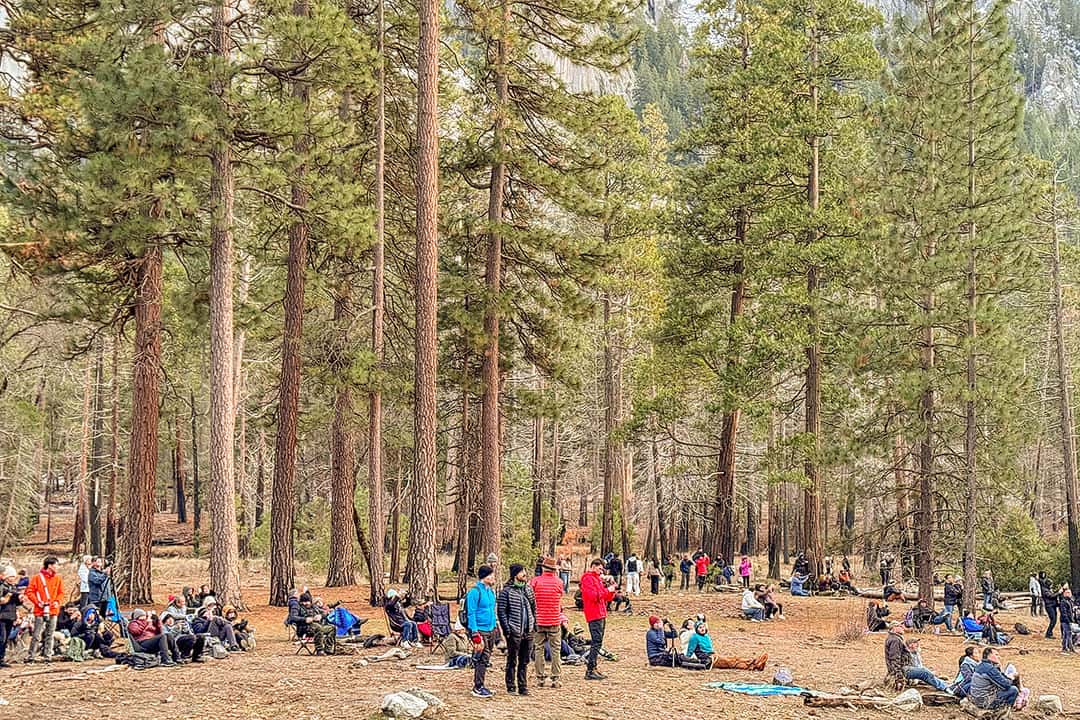
How to Photograph Firefall
If you’re photographing Firefall, here is what I brought:
- Camera – I shot with my Canon R5 while Jacob shot video on our iPhones.
- Long Lens – Bring your long lens (I use this lens and adapter). Wider lenses are great for capturing the scene with people.
- Tripod – Our Peak Design tripod travels with us everywhere. For iPhones, we use this tripod + mount. See our favorite travel tripods.
- Wireless Remote – my favorite purchase so far this year! You will want to use a remote or set your camera on timer mode. It also allowed me to experience Firefall, not through a screen.
OPTIONAL ACCESSORIES
- Rain Cover + Towel – for rainy or snowy conditions.
- Extra Batteries – Batteries die faster in the cold, so I keep spares in my inner jacket pockets. I packed six extra batteries but didn’t need any because the temperatures were so mild.
- Backpack – This is our go-to camera bag.
- Lens Cloth or Lens Pen – Gotta keep that glass clean.
Photography Tips for Firefall
- My Settings – Aperture priority, f/11, ISO 800, and between 1/10-1/50s because I had a tripod and remote.
- Timer Mode – If you don’t have a remote, use your timer mode so the camera does not shake. The remote makes it easy for impatient people like me to get shots instantly rather than waiting every few seconds.
- Exposure compensation – I typically underexpose my photos during sunset.
Let me know if you have any other photography-specific questions in the comments below!
See More: The Best Camera for Bloggers
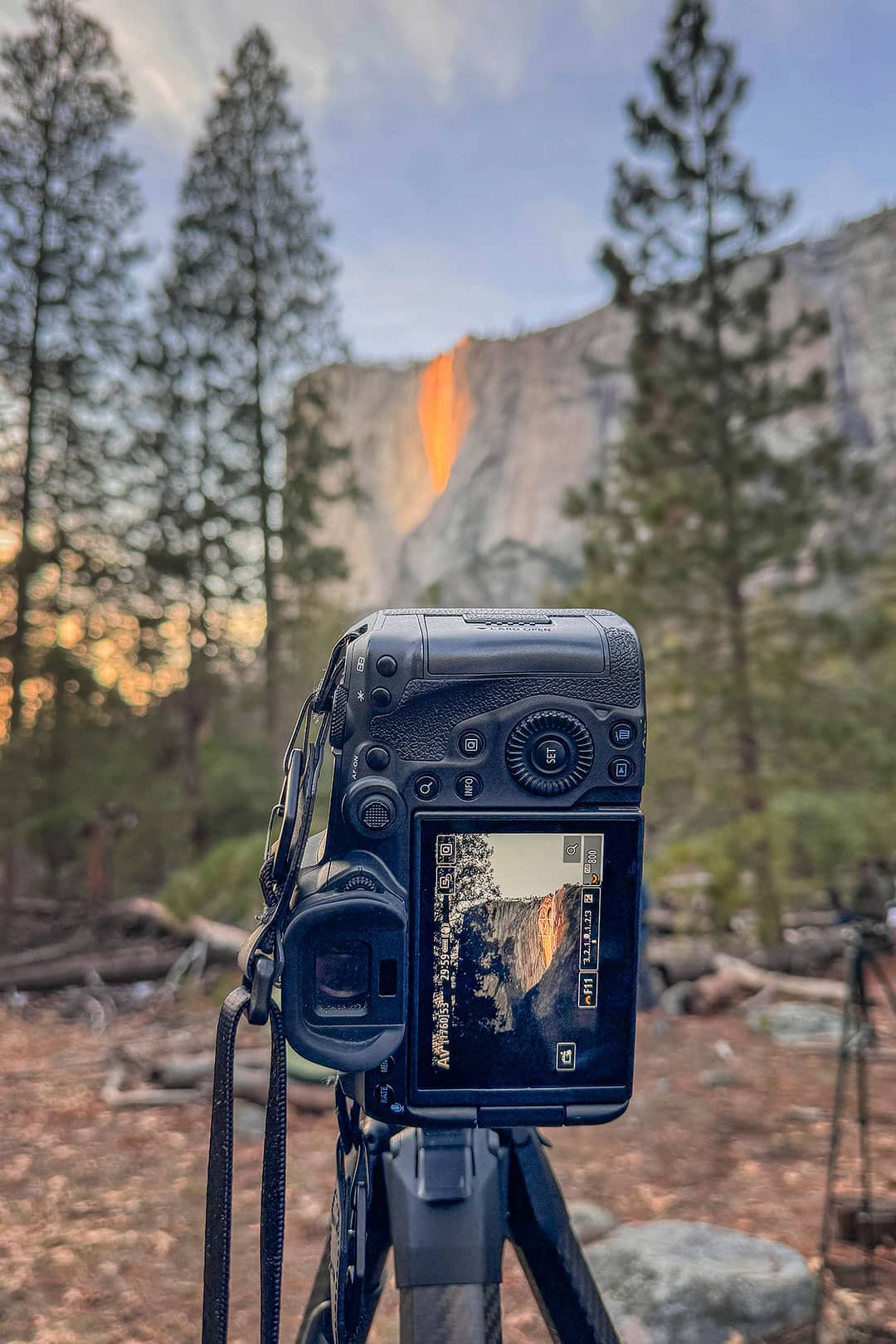
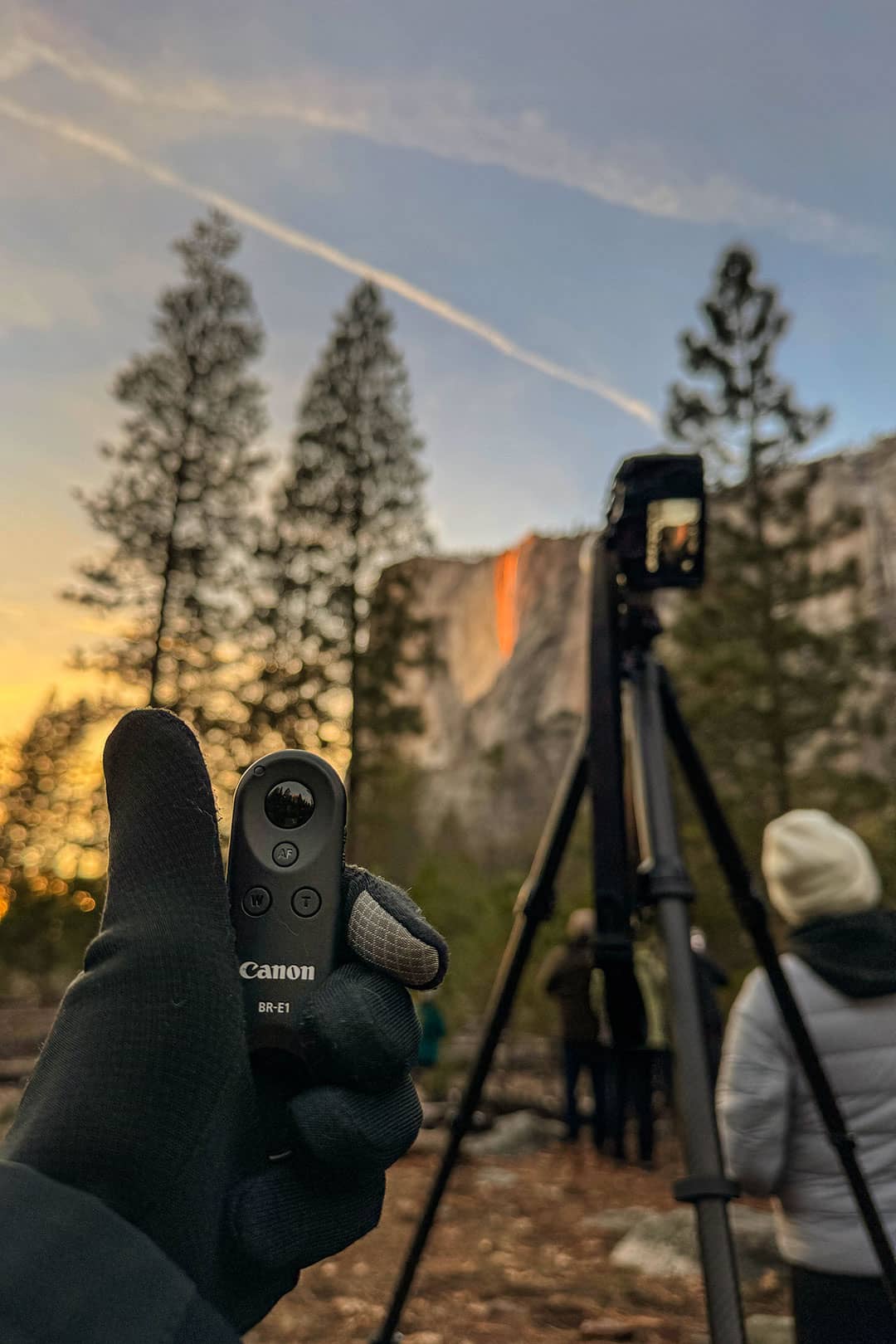
Essential Tips and What to Pack for Firefall
Here are some tips are you plan your visit in Yosemite for Firefall.
- Get an America the Beautiful pass to save money if you visit National Parks multiple times a year.
- Reservations are required on weekends during Firefall season. Make reservations here.
- Book a stay in the valley within walking distance from Firefall if you’re worried about reservations or crowded parking. It guarantees you access to the park without reservations, and it was nice to walk back to our bathroom rather than the porta potties.
- Check Yosemite’s Webcams to see the current park conditions.
- Arrive early on weekends to secure your viewing spot (3-4 pm is okay on weekdays earlier in the month). The volunteers said some people arrive in the morning on busy days.
- The rest of Yosemite is less crowded. Take advantage of this before and after Firefall. You can also snowboard, ski, snowshoe, cross-country ski, and snow tube at Badger Pass or ice skate in Curry Village.
- Stop by the welcome center to see which hikes are open and current trail conditions.
- Check road conditions as you plan your trip. If you’re worried about driving in snow, take 140 into the park rather than 41. The elevation is lower and less likely to have snow or ice.
- Have snow chains ready for Badger Pass. The road is at a higher elevation and often requires chains this time of year. They also have a complimentary shuttle from Curry Village, Yosemite Transportation, and the Yosemite Valley Lodge.
What to Pack for Firefall
- Camera Gear (detailed here)
- Snow Chains – they may be required depending on the road conditions. I hate putting chains on so I got Snow Socks this time because they are easier to put on, but we didn’t need them.
- Layers – It can be cold! Layers are the smart to help you stay warm. We dressed like we did when we lived in NYC.
- Waterproof Shoes – We had these sneakers for most of the day and also brought hiking shoes and snow boots.
- Battery Pack – For your phone! We love this one because we can charge both our phones simultaneously.
- Camping Chairs – our lightweight REI chairs came in handy when we arrived hours earlier.
- Foldable Wagon – We didn’t bring ours on this trip but saw other photographers carrying gear in wagons.
- Drinks – Fill up an insulated bottle with hot water or tea while you wait in the cold. These are our favorite bottles.
- Snacks – You could turn it into a picnic.
- Blanket – We saw some people with blankets, which looked cozy.
- Headlamp – for the walk back after dark.
- Crampons – If you plan on hiking, some trails had snow and ice.
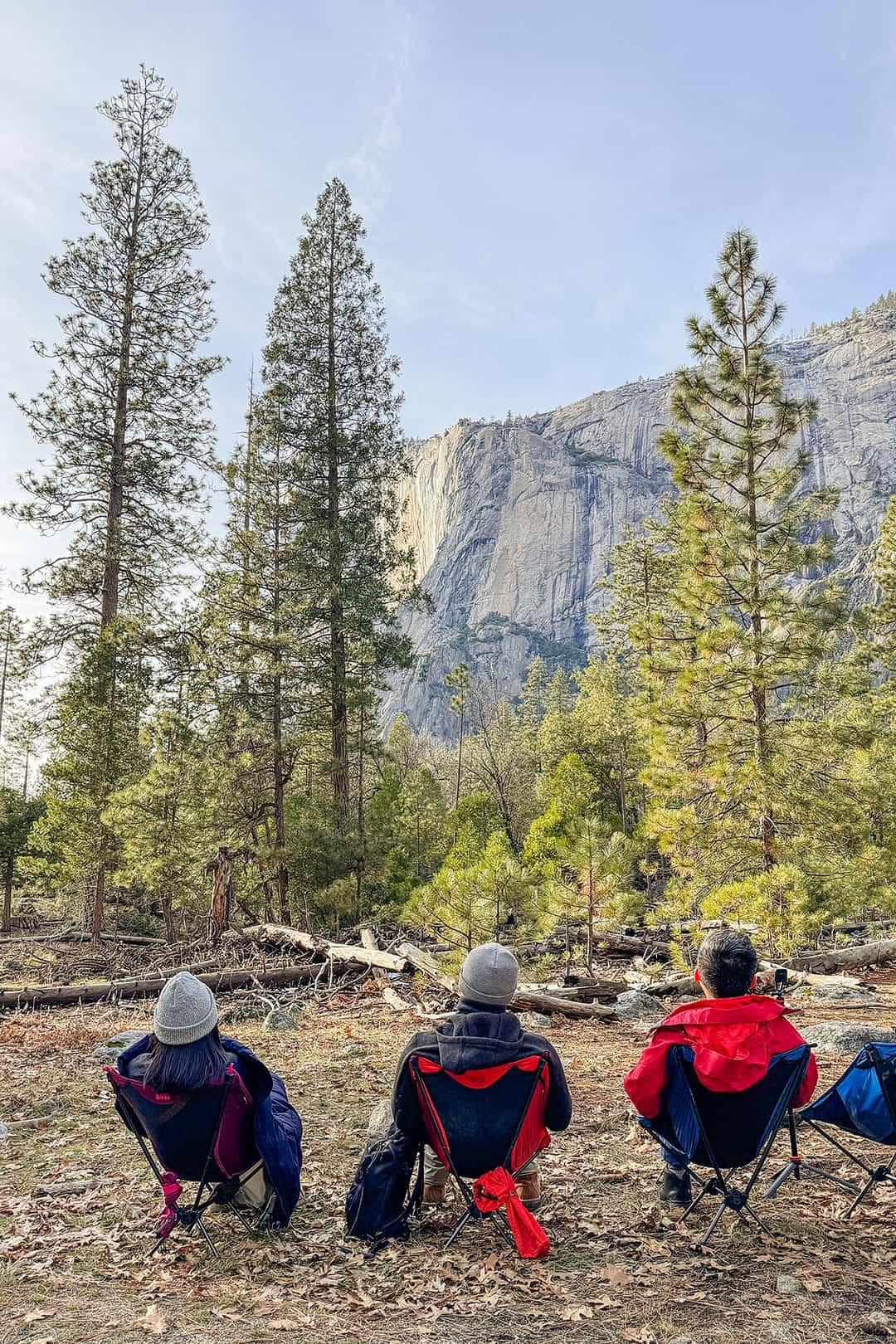
Where to Stay for Firefall Yosemite
We stayed at the Yosemite Valley Lodge, which is right next to the Firefall parking lot. Not only could we park without worrying about the Firefall crowds and traffic, it guaranteed us access to the park. It was nice being able to go back to the room whenever we needed anything. The room was comfortable and was the perfect location for this event.
Jacob has also stayed at the Wawona Hotel, but Yosemite Valley Lodge is the best location for Firefall. If we’re visiting any other time of year, we’ll stay at the Ahwahnee next.
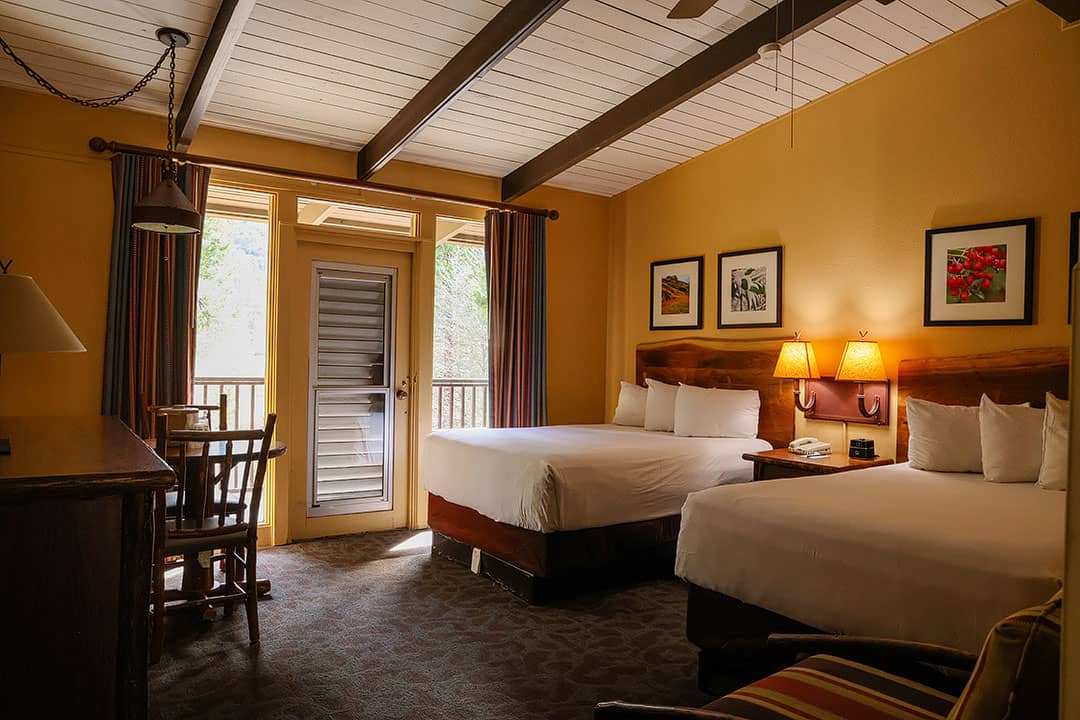
If you miss out on getting a spot in the park, check the map below for other options.
Where to Eat in Yosemite
We tried a few different spots during our visit. I’ve noted which meals they are open for: B – Breakfast, L – Lunch, D – Dinner)
- Base Camp Eatery (B, L, D) – Cafeteria-style spot with lots of options and good food. We liked the tenders, chicken sandwiches, and cookies.
- Mountain Room (D) – For a nicer meal, check out the Mountain Room. The food was tasty and it’s a nice change from the casual spots.
- The Ahwahnee Dining Room (B, D) – We had a breakfast buffet here on the last day. Going just to check out the dining room is worth it. It’s such a beautiful dining room. Note: It is Valet Parking only at the Ahwahnee and you can get 3 hours validated for $10 if you are dining there.
- Badger Pass Lodge (L) – During our morning at Badger Pass, we grabbed food before heading down. It’s fast casual and we thought the tenders were better up here. They also had a nacho dish that is a large portion if you have a big appetite.
Planning Checklist
- Get comprehensive insurance for your trip.
- Download these helpful language apps.
- Find a great deal on Yosemite hotels.
- Arrange a rental car for your trip.
- Book a tour for your visit.
- Get airport lounge access.
- Buy a travel charger to keep your devices charged.
- Get a new backpack for your trip.
- Buy a Yosemite travel guide.
- Pack the appropriate shoes for your trip.
- Don’t forget your in-flight essentials.
Have you been to Yosemite National Park during the winter? What was your favorite thing to do?
Did you enjoy this post? Pin it for later



SEE MORE NATIONAL PARK GUIDES
⟡⟡⟡⟡⟡
“Discovery consists not of seeking new lands but in seeing with new eyes” – M. Proust
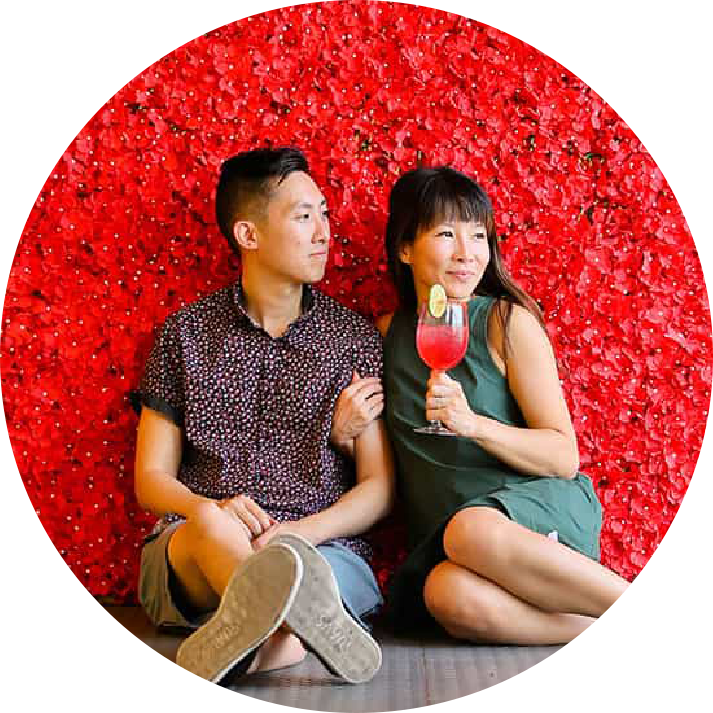
Esther + Jacob
Esther and Jacob are the founders of Local Adventurer, one of the top 5 travel blogs in the US. They believe that adventure can be found near and far and hope to inspire others to explore locally. They explore a new city in depth every year and currently base themselves in Las Vegas.
Follow on Instagram (E + J), YouTube, TikTok, and Pinterest.
